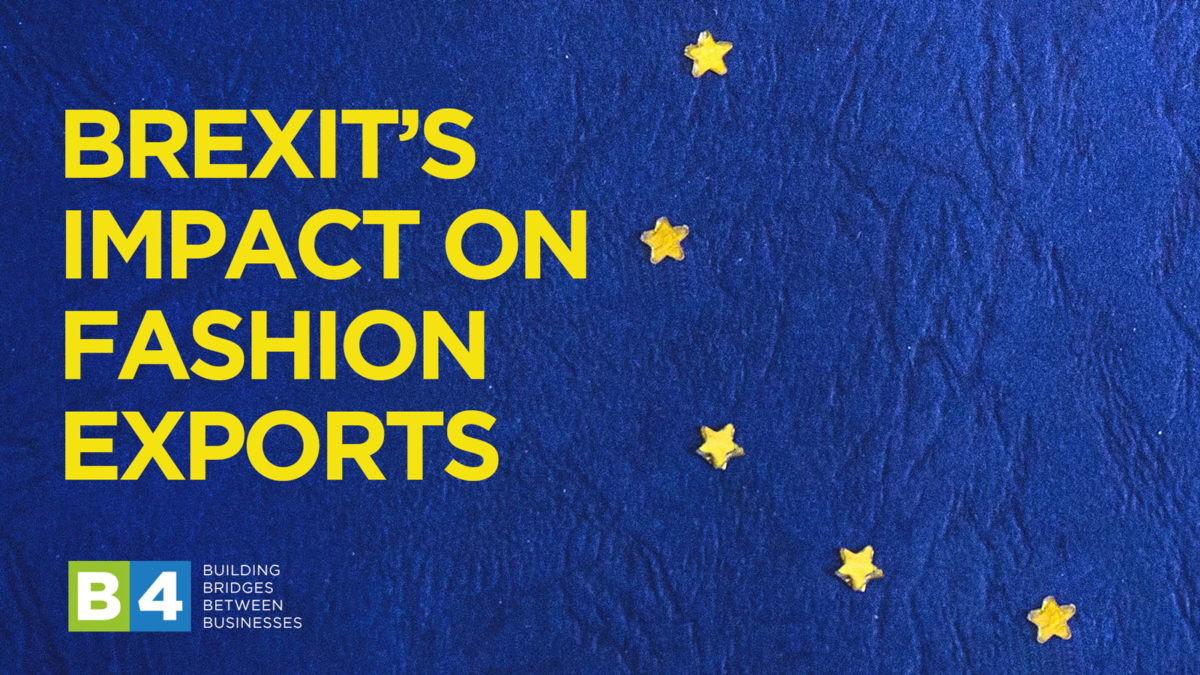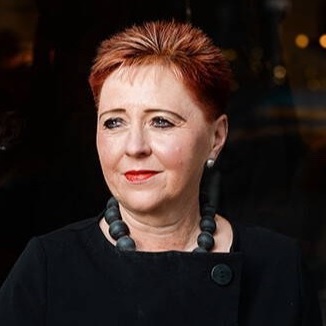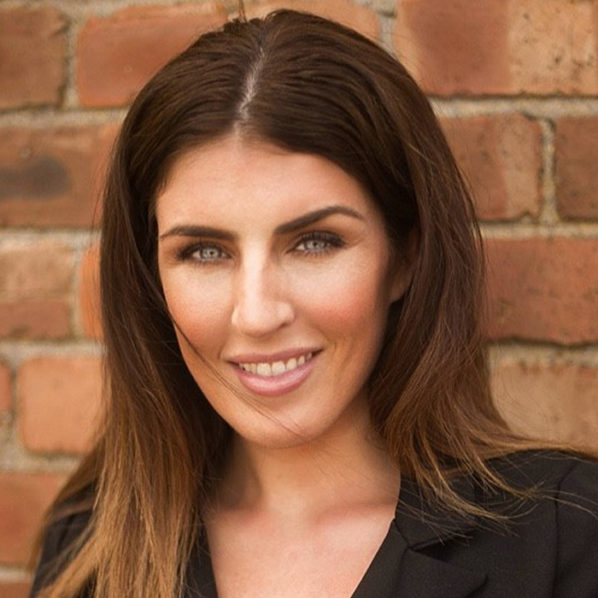
Brexit’s Impact on Fashion Exports
Brexit’s impact stretches far and wide, but one area many of us may not have considered is the fashion industry. Jodie Evans, Fashion Business Manager at Olivia May Ltd is joined by Managing Director, Ann
Whorrall and Operations Manager, Olivia Knight who discuss the impact of Brexit on their business, their customers, fashion exports and future strategy.
EU is one of the biggest markets for the UK fashion industry and it all used to work like clockwork…until Brexit and now COVID. With annual exports totalling £1.2 billion to Germany, £1.02 billion to Ireland, £0.6 billion to Italy and £0.45 billion to France, the potential loss of these markets due to the disruptions caused by Bexit and COVID are huge.
Established 2013, Olivia May has been the ultimate shopping destination for niche international and UK fashion designers. Providing effortless fashion for contemporary women, Olivia May stocks luxury womenswear, footwear and accessories, with boutiques and showrooms in Oxford and Cheshire.
Jodie began the discussion by explaining where Olivia May’s current focus lies. “Our customers are our priority and we are currently supporting them as much as possible. We’re also looking at their personas and behaviours and how the various changes are impacting them. We’re also looking at fulfilment times and trying to manage the ordering process as well as we can to ensure they get what they’ve ordered as quickly as possible.”
“We’re also looking at fulfilment times and trying to manage the ordering process as well as we can to ensure they get what they’ve ordered as quickly as possible.”
Jodie Evans



Sounds simple, but hearing from Operations Manager, Olivia Knight, about the challenges she faces on a daily basis, it’s clear that Brexit is having a significant impact on order fulfilment.
“But now we’re experienced a lot of disruption, even with the largest couriers such as DHL, DPD and UPS.”
Olivia Knight
“Since 2019 we’ve been working to unify our delivery proposition for our customers to stay one step ahead. But now we’re experienced a lot of disruption, even with the largest couriers such as DHL, DPD and UPS. We’ve been working with DHL for a year now. They have a paperless service which is very slick and means we don’t have to include customs invoices in parcels which helps them get through the process more efficiently.
“Even so, we’re finding that the authorities aren’t prepared for the increased border checks and this is impacting up to 25% of our sales. For each parcel going out of the country we have to input a commodity code (which includes details about what the item is made up of – we probably have 50 to 70 codes), the country of origin (where it’s made) and the threshold amount.
“The admin is significant. It probably takes 10 minutes longer per parcel – we have to make sure everything is correct so the customer doesn’t experience any additional costs at their end, or delays. I’d say DHL are very slick – we use them to send worldwide and they have a fantastic door to door service. Their process is very easy. We tend to use DPD within the UK and EU but they do hand over to third party companies, which does make the whole process a little harder to manage.”
The impact of COVID has also had significant implications. “The border closure and impact of Brexit has delayed parcels by up to 4 weeks. As a business, it’s tricky dealing with the day to day and also dealing with customers who are asking where their parcels have got to. We struggle to get information from customs to locate parcels so we’re in the dark a lot of the time.”
Jodie asks Olivia if these challenges are impacting deliveries coming in to the business? “Yes because they’re going through the same process so we’re not getting out orders in as quick. This has caused delays for new season stock going on line.”
Jodie highlights the need to have a longer term strategy to support Oliva May’s customers. “Customer data is vital to ensure our communication and services are as effective and efficient as possible. We have to look at targeted marketing, transparency with our customers and managing expectations professionally. We need to be innovative moving forward with bespoke soutions for customers.”
“We need to be innovative moving forward with bespoke soutions for customers.”
Jodie Evans
So if you’re a UK customer shopping on European sites, the advice is to check where the seller is shipping from, the country of origin (so you don’t incur additional costs on delivery) and make sure all costs are included when you buy and that there aren’t any hidden extras.
Jodie asks Ann, as MD, what she expects for the future of the business. “It’s been such a steep learning curve for all of us. All of our EU designers probably weren’t expecting the country of origin issue which adds, potentially, 12% to costs. They have really had very little time to make any adjustments to their strategy for the new season. Moving forward, some designers are trying to absorb these additional costs at the start of the design process and they’re being selective about which products they make available for export.
“It’s been such a steep learning curve for all of us. All of our EU designers probably weren’t expecting the country of origin issue which adds, potentially, 12% to costs.”
Ann Whorrall
“I expect many of the designers will sit back and consider whether the UK market is for them, so we may see less designers supplying to the UK. COVID has also had an impact, it’s not just Brexit. As Jodie said, strategies in terms of customer service are crucial. As we buy from around the world we need to be really careful to make the right buying decisions based on the country of origin. Undoubtedly this will have a huge impact on the luxury market in terms of what is available in the UK.
“There’s a lot still to be decided on that’s out of our hands…it’s confusing for us so imagine how confusing it is for our customers. I fully expect the situation to become clearer for everyone soon…it has to, for everyone’s sake.”
Catch up with the full discussion at the links below, either on video or podcast.
More in Business Strategy

What prospects are thinking but often fail to ask
I was at a B4 Ecosystem Event recently run by Caroline O’Connor of Fourth Born and she posed a brilliant question to the room. Article by David Finch of Purple Frog

‘Meanwhile in Oxfordshire..’ Case Study: Ducky Zebra, the sustainable kidswear brand...
‘Often girls’ clothes are pink, cute and impractical. They promote kindness, but not always confidence. And boys’ clothes are often blue, aggressive and adventure seeking. They promote confidence, but not always kindness. I wanted to bring these two characteristics together and allow all children, no matter what their gender, to celebrate both kindness and confidence.’ – Sally Dear, Founder of Ducky Zebra

Innovative drone delivery trials take place at Milton Park
A pilot demonstration for a set of innovative drone and electric van freight trials was successfully completed at Milton Park.
From this author

B4 Reviews – with Ruth Hawkins
Richard has recently asked me to find and lead a small team of reviewers from the B4 community, so over the next few weeks I will be looking to build that team and also looking for venues, events and activities from within the B4 network and beyond to write some reviews!

Get Support Announced as B4’s Official IT Partner
We are delighted to announce that Oxfordshire’s leading IT Services provider, Get Support, have become B4’s Official IT Partner.

Reliable Vehicle Servicing and Repairs with Pete Thirtle
When it comes to maintaining and repairing your vehicle, trust and expertise are paramount. That’s why Pete Thirtle Vehicle Services stands out as one of the go-to independent garage for drivers in Bicester, Oxford, and the surrounding areas. With a reputation built on honesty, reliability, and top-tier service, Pete can ensure that your vehicle receives the best care possible. B4’s CEO, Richard Rosser, shines the spotlight on the ultra-reliable, Pete Thirtle.


